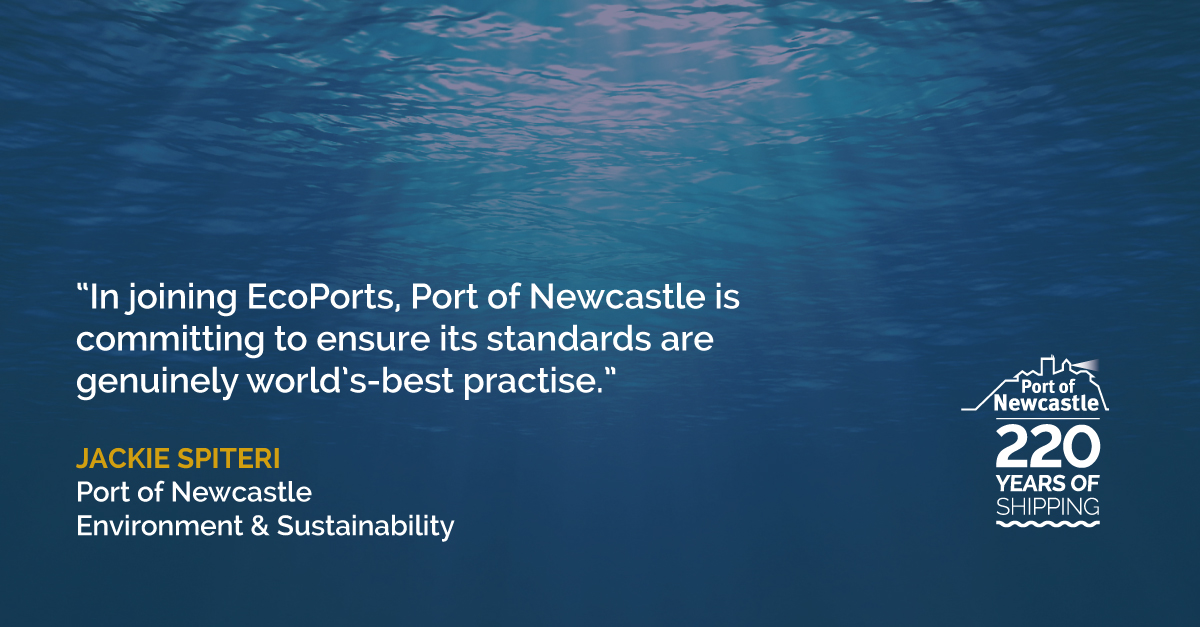
In business, being the first to do something is typically a key competitive advantage. When it comes to the environment and sustainability, such a position brings with it responsibility. Earlier this year, Port of Newcastle became the first port in Australia or New Zealand to become a member of EcoPorts.
It required the Port to commit to having its environmental and sustainability practices benchmarked against 120 major ports across Europe, Asia, North America and South America. Much as it should be, Australia is not a leader in this space. There is a tremendous opportunity to learn from leading ports overseas.
In joining EcoPorts, Port of Newcastle is committing to ensure its standards are genuinely world’s-best practise. How we measure our impact on the environment and ensure we operate sustainably must be calibrated against global leaders in this area, not other Australian ports. However, as a regional leader, Port of Newcastle is also committing to championing these environmental and sustainability benefits to other ports and the maritime industry across the region. Already this year a number of other ports in the region have begun a process to work towards EcoPorts membership. We will celebrate every step taken in this space. Ports may compete for trade, but on the sustainability front we should remain united in our aspirations.
I am often asked about the function of EcoPorts membership. Developed in 1997, EcoPorts remains the only Environmental Management Standard (EMS) specific to the global port sector. EcoPorts is especially designed to include the industry specific tasks and liabilities of ports and port terminals, while using the ISO 14001 structure. The exclusive focus on ports is critical. It recognises that ports are inherently complex in their operation and the environmental and sustainability framework that is applied to each port must actively address this complexity.
For Port of Newcastle, there are a number of projects underway to further cement the organisation’s sustainability efforts. The Newcastle Container Terminal will feature automated quay cranes, driverless straddle cranes, automated gantry cranes and electric operations. This means no diesel emissions and no noise pollution on port landside equipment. In delivering a fully-automated and fully-electric container terminal, the port will improve efficiency, reduce emissions and minimise its environmental impact.
Similarly, upgrades to the Newcastle Bulk Terminal – including a new ship unloader with state-of-the-art crane and conveyor infrastructure – are as much about safety and environmental compliance than they are about efficiency. There are also a number of unseen projects, including a $600,000 investment in engine modifications for the Port’s permanent dredger, David Allan. This upgrade has resulted in a 60% reduction in oil consumption at a time when the marine operations had also switched to ultra-low sulphur diesel fuel. Port of Newcastle operates with smart water and energy meters and will be moving into modern and more environmentally-friendly offices in May. The Port’s sustainability program goes beyond its boundaries, with a $50,000 investment in habitat restoration within the Hunter Wetlands National park and $60,000 on monitoring salt marsh around the Port.
All of these initiatives, including the efforts to become an EcoPorts member, are driven by an overarching organisational commitment to sustainability. Port of Newcastle is merely the custodian of the Port for the NSW Government and the people of NSW. We are proud to play this role. This requires us to have systems that enable us to be compliant, efficient and sustainable. It is about managing our own environmental impact today while also developing the port to ensure it is more sustainable tomorrow. It requires a focus not only on what happens inside the port boundary but also making an active contribution to what happens in the local environment around us.
In choosing to be a pioneer in the region, there is a commitment for Port of Newcastle to be transparent in its approach and pursue continuous improvement as a resilient and sustainable port. But, for Port of Newcastle, it does not stop here. Aligning processes and standards to a global benchmark is an important step. But accountability against these standards is another milestone. The Port is working towards achieving certification under EcoPort’s Port Environmental Review System, which is independently tested against best practice management by Lloyds Register and is the only system of its type in the world. Port of Newcastle is on track to seek certification in the second half of 2019. In the meantime, the Port continues to advocate for others across Australia and New Zealand to come on board in the interests of sustainability.
Jackie Spiteri leads environment and sustainability at Port of Newcastle
** This article first appeared in the June 2019 edition of Daily Cargo News
